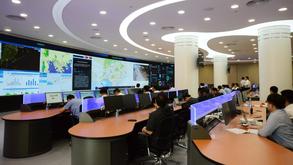 In this undated file photo, employees monitor various developments in the city at the Futian Smart City Command Center in Shenzhen, Guangdong province. (PHOTO / XINHUA)
In this undated file photo, employees monitor various developments in the city at the Futian Smart City Command Center in Shenzhen, Guangdong province. (PHOTO / XINHUA)
Government departments and businesses across the nation are stepping up cooperation to accelerate the digitalization of government services as part China’s broader push to develop “smart cities”, officials, business leaders and scholars told a forum.
While the coronavirus pandemic forced many companies almost overnight to adopt digital methods of doing business, it has also catalyzed digital changes among government departments. With travel restrictions being imposed, enterprises and individuals had to turn online to deal with various corporate and personal matters.
While the coronavirus pandemic forced many companies almost overnight to adopt digital methods of doing business, it has also catalyzed digital changes among government departments
ALSO READ: Digital event sharpens focus on breakthroughs
Participants in the forum, held on Sunday in Fuzhou, Fujian province as part of the Digital China Summit, said they believe the digital transformation of government services is an inevitable trend and urged more efforts to be made to tackle the challenges lying in the process.
Xu Kaijun, deputy head of Shenzhen’s government service data administration bureau, said Shenzhen is striving to improve its e-government services in a move to enhance governance capacity and create a better business environment.
The city – with a young population that is very comfortable using mobile internet services – in particular has a strong need to take action on this aspect of digitalization, he said.
The city launched i-Shenzhen, an official mobile app on which more than 7,700 types of services offered by municipal and district government departments are available. Over 96 percent of individual matters and 60 percent of corporate affairs can be dealt with on the digital platform at the present time.
ALSO READ: Chinese digital economy gets big, 'fresh' boost
Zhuhai, another city in Guangdong province, has also moved its government services online by introducing official mobile app Zui Zhuhai. Shen Yan, head of the Industry and Information Technology Bureau of Zhuhai, said the aim of launching the digital platform is to provide a new channel for local residents to get access to various public services, while at the same time pushing forward reform and innovation inside local government.
“A major challenge lying in the process of digitalization is how to integrate the data and information of different government departments into one platform,” Shen said. “This is what we are striving to solve at the current time.”
Behind the efforts by local governments to promote digital transformation is the broader push by the country to build “smart cities”. That not only includes smart governance, but also covers smart transportation, smart healthcare, smart security, etc.
“The boom of new infrastructure construction is bringing huge opportunities for us,” said Du Peng, deputy party secretary of Ping An Group, noting that more than 20 provinces and cities across the country have rolled out their plans to build new infrastructure this year, which could drive investment totaling 34 trillion yuan (US$5.04 trillion) or more.
ALSO READ: Govt gives digital economy new impetus
Businesses should embrace openness and cooperate with each other to achieve a win-win situation, he said.
Du added that Ping An Smart City, a unit of Ping An Group focusing on smart city projects, has been serving more than 87 million people in 118 cities across the country.
Li Peigen, a professor at Huazhong University of Science and Technology, meanwhile, said while China has done a lot of work in building smart transportation, smart governance and smart public security, greater attention needs to be made in the fields related to people’s livelihoods, such as how to use smart ways to help ease elderly care, chronic disease management problems.
READ MORE: 'Digital economy' ready to power FTZ in Beijing


